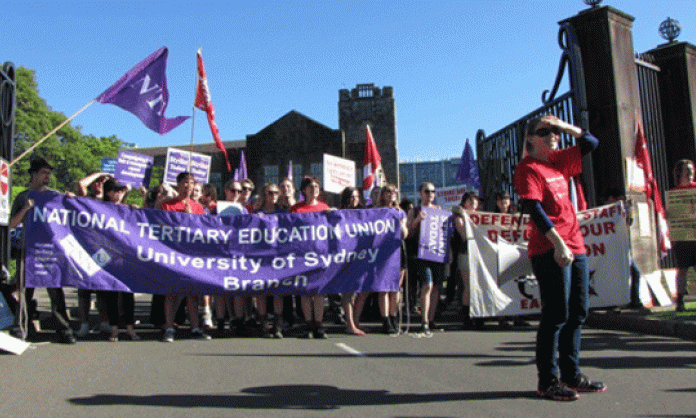Your life doesn’t matter. As a worker, you’re just a pair of hands, worthwhile only when those hands can turn a profit.
As general staff redundancies are announced at the University of Sydney, this is the message we hear. Our plans – to pursue further education, have another baby, save enough for retirement or spend time with a dying parent – are in disarray because of a people-culling process known as “spill and fill”.
A “spill and fill” is as simple as it is brutal. Overnight, your job is made redundant. A new structure is drawn up. You either don’t exist in the new plan or have to re-apply for the job you’ve been doing for years.
In an earlier “spill and fill”, a woman who had worked at the university for 18 years was made redundant, then told she could re-apply for her job on $20,000 a year less.
Staff will scramble for one role where there had been two or three. Those who survive will have increased workloads.
Redundancies are about discipline as much as they are about saving money.
You’re less likely to speak up about workplace issues – health and safety, bullying, workload – until you feel “safe” again.
“Every day feels like a job interview”, said one worker from the Faculty of Arts and Sciences at a recent union meeting. You never know when you might say something that will put you offside, or if you’ve already said it and your name has been crossed off a list somewhere.
For another worker, in the finance department, the news of another restructure came at the same time as news that her mother is in her last days. She had wanted to take leave to be with her, but it’s not as simple as that. There isn’t anyone to cover her workload if she did get time off, she told me. This is the effect of years of staff cutbacks, forcing people to do more work for the same pay. The experience has left her demoralised.
“I’ve been working my whole life and now I’m just realising we’re all cannon fodder, here and in the rest of society; we’re just cannon fodder for them”, she said.
This round of cuts will affect about 50 general staff, but more losses have been flagged as the administration works on plans for major changes to course structures. It has signalled that it wants to drop about 100 of the degrees currently on offer at the university.
In a recent address to general and academic staff, the deputy vice-chancellor, Stephen Garton, gave a frank account of the university’s approach. For too long, the University of Sydney has been reluctant to scrap “underperforming” staff. This is about to change, he warned.
At the same meeting, vice-chancellor Michael Spence made it clear that in the university’s view, “underperforming” staff are those in departments not engaged in “strategic” areas of research. “Strategic” research is code for research that brings in money.
It will be up to the main staff union, the National Tertiary and Education Union, to fight the cuts. Already, a meeting of about 100 people has been held to plan a response. A rally will be held at the start of semester two.
A union-led campaign will need to involve and empower the rank and file, in the way that recent successful industrial campaigns at the university have. The union must reject the university’s line that redundancies are inevitable. Instead, we should demand that workers are placed in new jobs they’re qualified for or trained for others.










